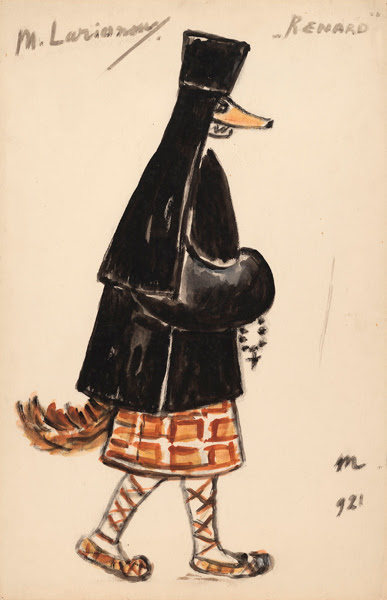
Mikhail Larionov, Costume design for Renard, 1922, (c) Houghton Library, Harvard University
Monday 14 December 2015
10.20-14.30
The Department of History of Art, University of Cambridge
The centenary of the riotous first performance of Igor Stravinsky’s best known modernist work, Le Sacre du printemps (1913), has inspired numerous scholarly and public events in recent years. Less well known are the works Stravinsky wrote in Switzerland during the wartime years, which saw him developing his interest in themes drawn from Russian folklore. After the Pribautki of 1914, the one-act ‘burlesque in song and dance’ Renard, commissioned by the Princess de Polignac, was written between 1915 and 1916; this was followed by, among other works, The Cat’s Lullabies (1915), Three Children’s Tales (1917) and Four Russian Peasant Songs (1917).
This interdisciplinary workshop explores ideas of folk, myth and ritual in early twentieth-century Russian culture. It comprises four papers situating Stravinsky’s work in the context of visual culture, music, fashion and dance, followed by a panel discussion. Papers seek to highlight synergies between modernist trends in these differing genres during the ‘Silver Age’, as well as the impact of Russian culture on the development of modernism in Western Europe around the time of the Great War.
For a full programme and booking instructions, please visit http://ccrac.hoart.cam.ac.uk/upcoming-events/
This workshop is organised by the Cambridge Courtauld Russian Art Centre and seeks to complement the Philharmonia Orchestra’s 2015-2016 season ‘Myths and Rituals’. For more information, see here.
The event is enabled by a conference grant from the Department of History of Art, University of Cambridge.
Convenors: Dr Rosalind Polly Blakesley: University of Cambridge; Dr Louise Hardiman: Independent Scholar